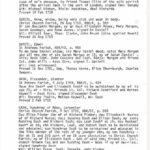
Date of Birth
1503
Place of Birth
Wellingborough, Northamptonshire, England, United Kingdom
Towns / Cities Moved Into
-
Known Occupation
Baron Henchman of Wellingborough
Religion
-
Spouse
Death Information
Year of death
1600
Place of death
Ashley, Northamptonshire, England, United Kingdom
Cause of death
-
Obituary

Parents

Thomas Crosborough Henchman

Anne Griffiths
Marital Status


Married Alice De Pinder
1523
Children

Narrative / Story
In the quaint town of Wellingborough, Northamptonshire, England, in the year 1503, a child named Richard Henchman was born into the world. His early years were marked by the tranquility of rural England, under the watchful eyes of his parents, Thomas Crosborough Henchman and Anne Griffiths. The rolling hills and verdant fields of Northamptonshire were his playground, shaping his character and values.
As Richard grew, he witnessed the transformative power of the Renaissance sweeping across Europe. The year 1522 saw Martin Luther’s publication of the German translation of the New Testament, a pivotal moment in religious history that undoubtedly echoed through the corridors of his home. Just three years later, William Tyndale translated the New Testament into English, further igniting religious and intellectual fervor across the land.
In 1523, Richard’s life took a significant turn as he married Alice De Pinder, a union that would bring him joy and companionship. Together, they welcomed their son, Thomas Henchman, into their family. Richard, known as Baron Henchman of Wellingborough, embraced his responsibilities with the same vigor and dedication he had shown in his youth.
The couple’s life was a tapestry of love, duty, and societal obligations. As a baron, Richard’s role was not just as a landowner but also as a custodian of his community’s welfare. His work life was intertwined with the socio-economic fabric of the time, where feudal systems still held sway, and the nobility bore the weight of leadership and governance.
The Henchman family’s life was set against a backdrop of significant historical events. In 1540, the invention of the pistol marked a turning point in military technology, a development that would have been of great interest to a man of Richard’s standing.
Despite the privileges that came with his title, Richard and his family were not immune to the challenges of their era. The socio-economic issues of the time, particularly those related to class and hierarchy, would have been a constant presence in their lives. However, there is no specific record of them facing discrimination based on race, as the societal structures of the time were predominantly influenced by class and lineage.
Life in 16th century England was a blend of progress and tradition. The Henchman family would have experienced the cultural and technological advancements of the time while adhering to the customs and practices that had been passed down through generations.
In 1600, after a life rich in experiences and contributions to his community, Sir Richard Henchman passed away in Ashley, Northamptonshire. His death marked the end of an era for the Henchman family, but his legacy continued through his descendants and the lasting impact he had on his community.
Sir Richard Henchman’s life story is a window into a pivotal era in English history. His journey from a child in Wellingborough to a respected baron reflects the broader narrative of a country on the cusp of monumental changes, both socially and culturally.
